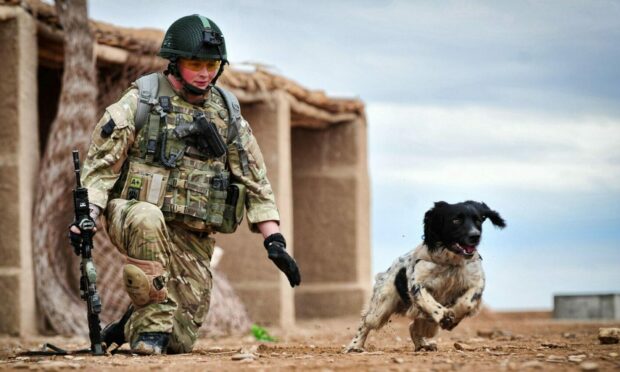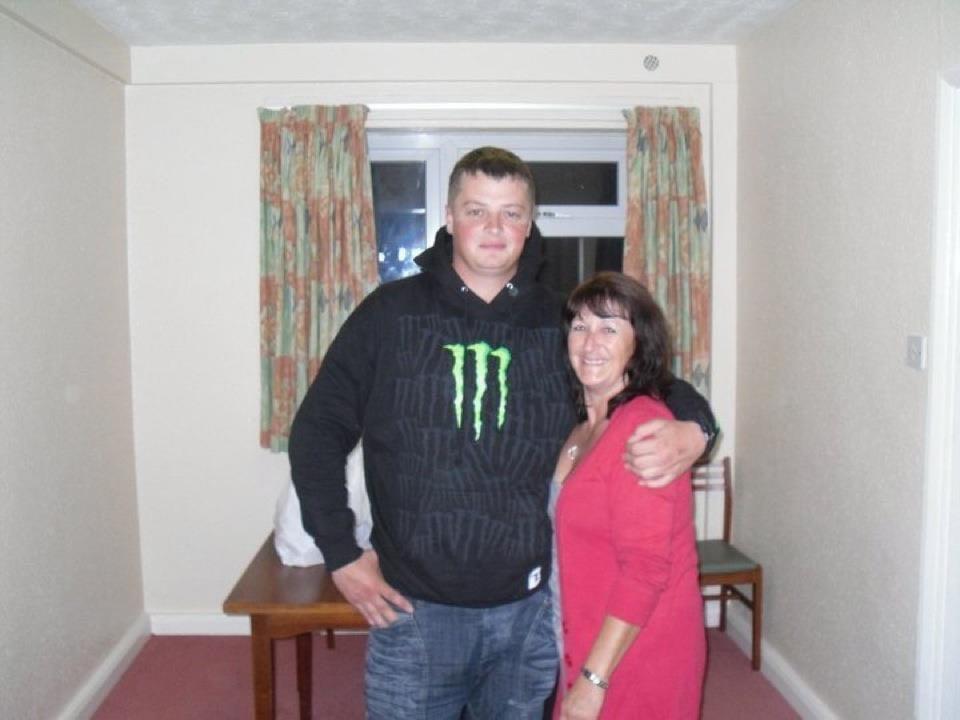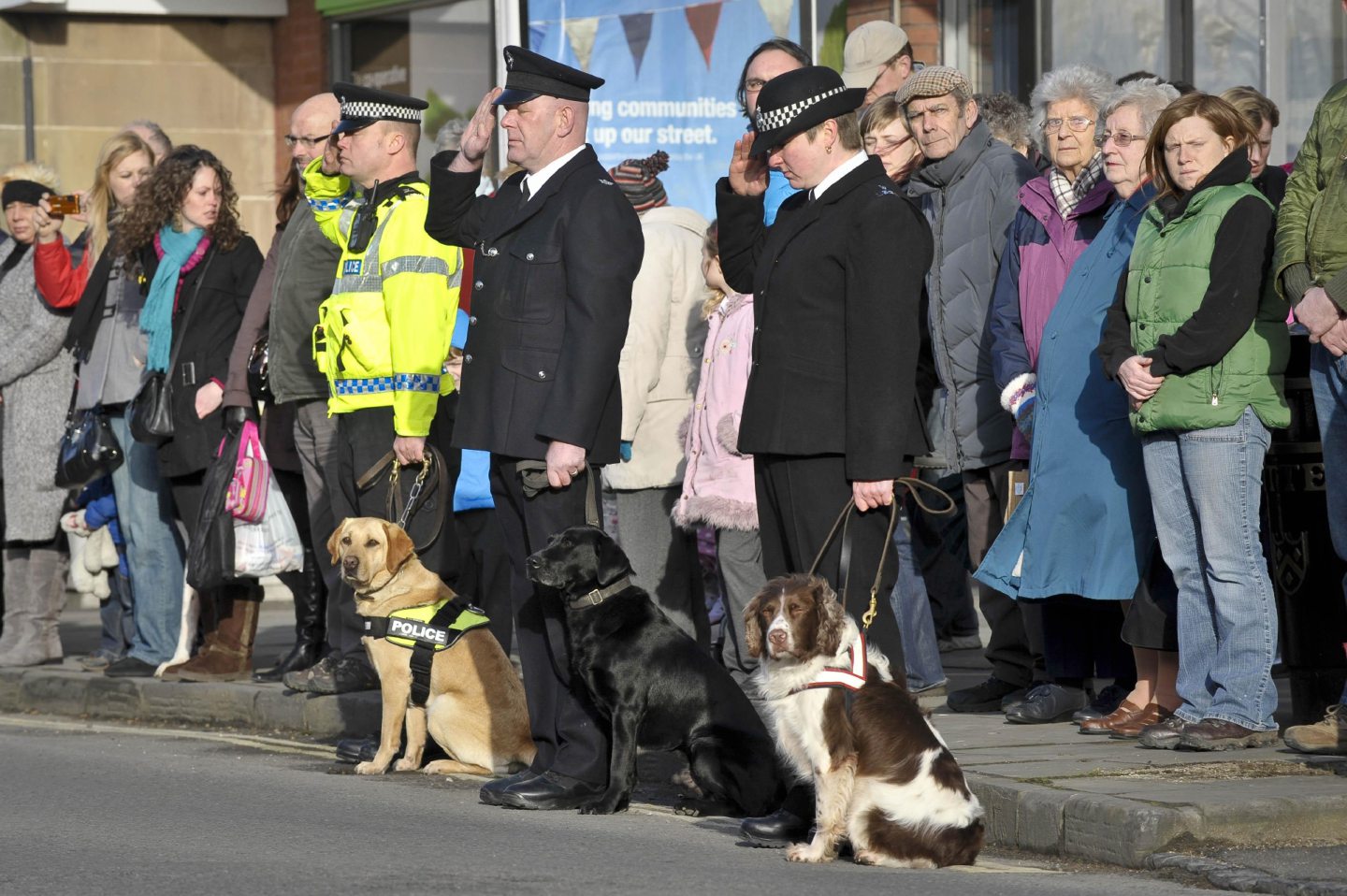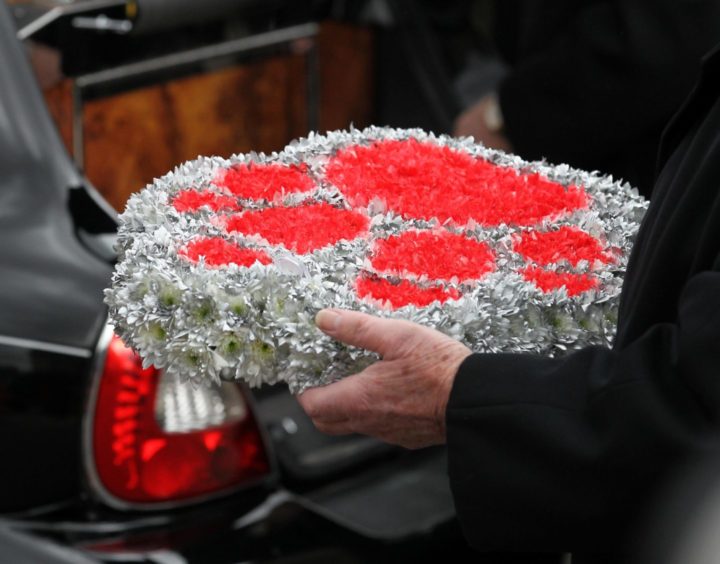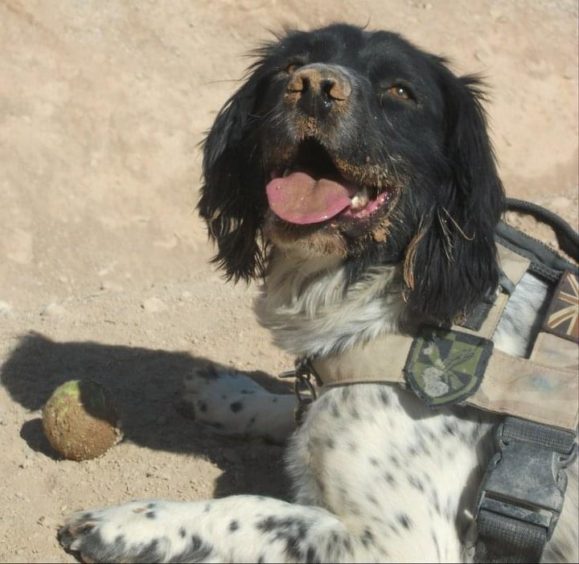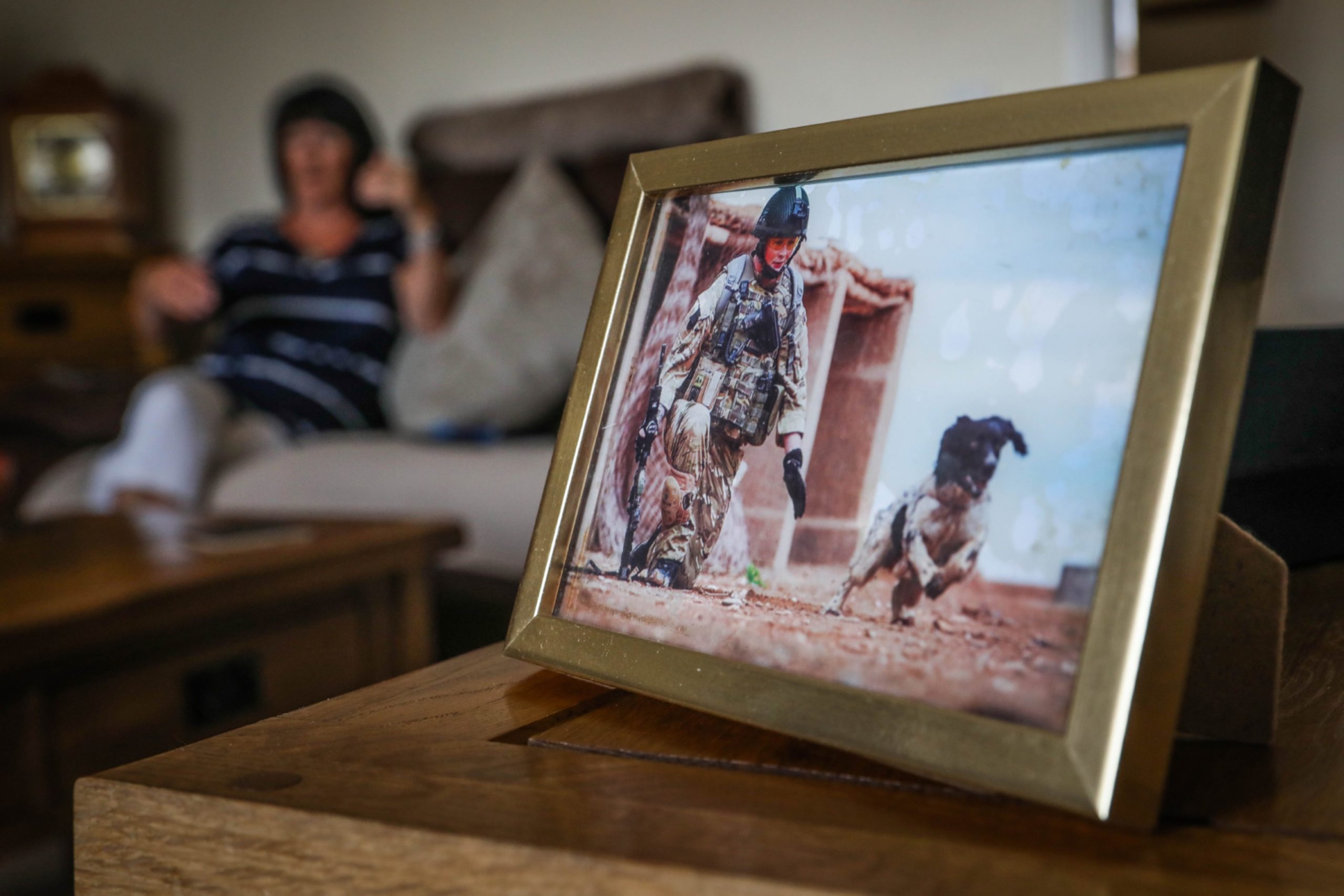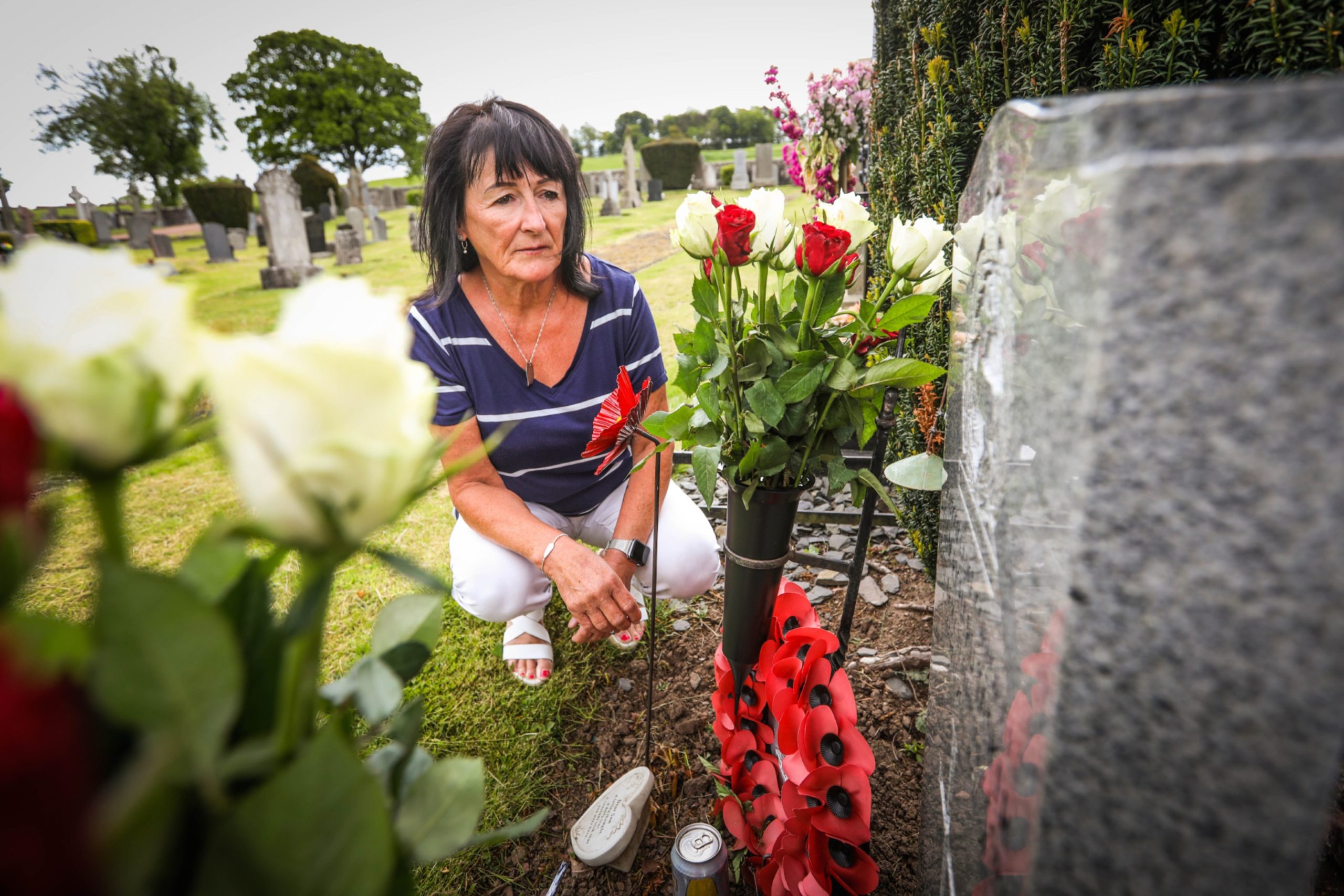She suffered every mother’s worst nightmare.
When Jane Duffy’s beloved son Liam Tasker went off to fight on the frontline in Afghanistan, she was happy he was trying to keep people safe, battling terrorism in the killing fields of Helmand.
But her world was ripped apart when he was killed by a single bullet alongside his military working dog Theo in 2011.
Now, just after the 10th anniversary of his death, she fears the conflict in Afghanistan has become Scotland’s forgotten war – an overlooked campaign consigned to the history books as our remaining soldiers, along with US troops, come home.
At his graveside in the village of Tayport, Fife, where Liam lies buried with Theo, she said: “This is the reality of Afghanistan. We can never forget that.”
She also spoke of the “death letter” Liam wrote to his family which most soldiers pen before they head into conflict in case the worst happens.
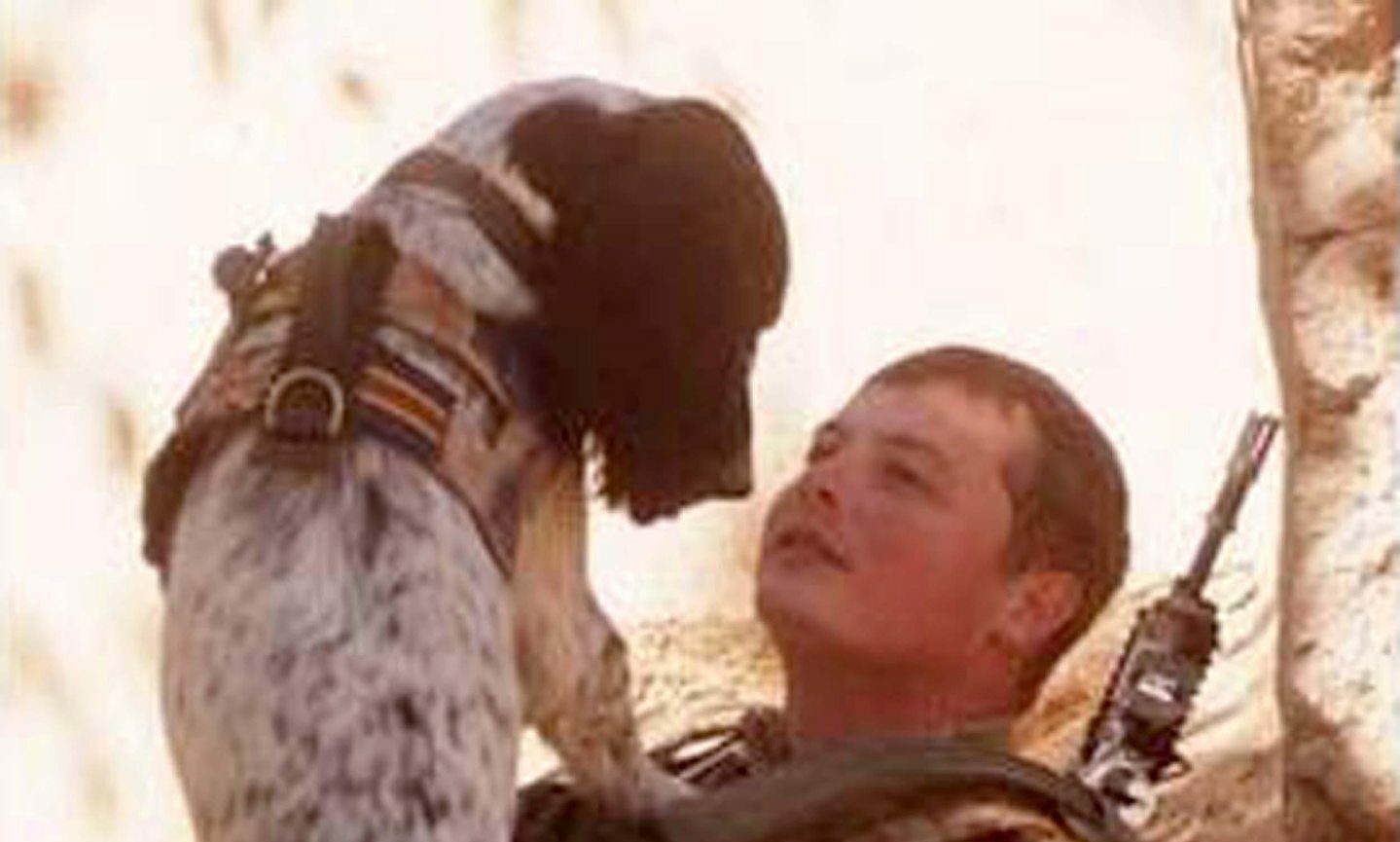
Jane added: “Part of me will always be in Afghanistan. In the letter, there is a bit where he says ‘Each day is a gift and not a given right’.
“He was going to get that as his next tattoo. I got it tattooed on my arm. It does help to sometimes look at the letter, it gives us a bit of solace.”
‘Part of me will always be in Afghanistan’
Liam – who was just 26 when he died – was buried with Theo after the dog died of “a broken heart”, according to Jane, after witnessing his human partner being shot in the mouth.
Jane’s greatest fear has been realised – losing her son. Now, she fears that her next biggest fear is coming to pass – that his sacrifice is being forgotten.
Gran Jane, 62, who worked as a school catering assistant, said: “I wanted to take my life about two years ago. I just hit rock bottom.
“I thought I was fine. You don’t get any help, you’re just trying to be strong for your family but I got to the point where I just wanted to be with Liam.
People need to understand. It’s horrific losing a child in any circumstances but for a cause that I feel was a waste of time now that they are pulling out and you don’t see any change.”
“I just thought I can’t do this anymore. Everybody was saying he wouldn’t want you to do that but he knew how much I loved him and he would know how much I am suffering.
“People see you out and about and think you are normal and fine, out for a drink, having a laugh, but this will never leave me. It will never go away.
“Part of me will always be in Afghanistan.
“People need to understand. It’s horrific losing a child in any circumstances but for a cause that I feel was a waste of time now that they are pulling out and you don’t see any change.”
Liam was killed in 2011. He was working in an area dotted with boobytrap bombs, known as improvised explosive devices (IEDs).
Liam and Theo, who together had uncovered a record 14 IEDs, were guiding a patrol through the deadly Shingazi area.
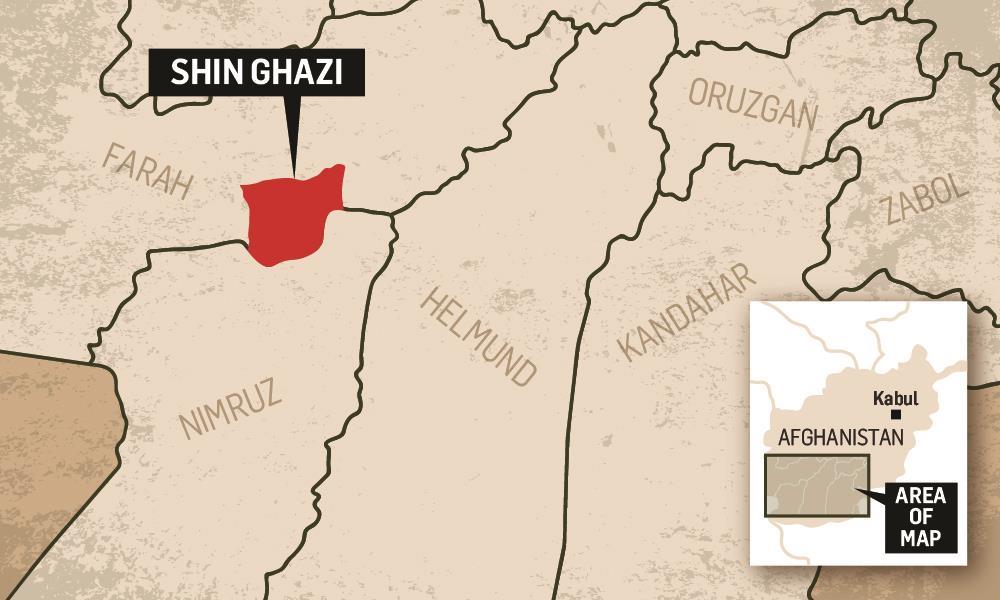
With Theo attached to a line at his waist, Liam led at the front of the group who had been on their way to a meeting with Afghan community leaders and US troops.
Soon after they headed out, Theo sniffed out a plastic bag with a black wire attached. They were then ambushed as the Taliban, who had been lying in wait, bombarded them with machine gun fire.
Liam was struck in the face and died instantly.
Theo was cut free of Liam’s body and taken to the base to recuperate.
Later, Theo started to have fits and was taken by helicopter to Camp Bastion where he died following a seizure.
Crowds thronged the streets of Wootton Bassett when Liam and Theo’s bodies were flown back to the UK.
Liam was one of more than 450 British soldiers killed in the conflict in Afghanistan, one of the nation’s longest campaigns spanning 20 years, longer than World War One and Two, the Falklands War and the Korean War combined.
He came from a military family with a number of relatives in the armed forces. His step-dad Jimmy is a civilian in the RAF, still based at Nato HQ in Belgium.
‘I started screaming and collapsed’
Jane and her teenage daughter Nicola were living there with him when Liam died. She still remembers every detail of the fateful day when she was told Liam had died.
She said: “I went to the door and there was a man in front of Chris, the camp padre, that I didn’t recognise.
“The two of them came walking up and Chris was in short sleeves. I remember that – that threw me because if it was anything – he wouldn’t be in short sleeves.
“But he was for some reason. Something just went in me and I said: ‘Is it Liam?’ and he was saying yeah, we have received some unfortunate news and I said: ‘How bad is he? Is it his legs, his arms, what is it?’
“He was telling me he was killed in action and I wasn’t taking it in. He seemed to come and get a hold of me and I can’t recall much after that.
“I started screaming and collapsed.”
Liam had joined up just before the September 11 terror attacks in the US which would trigger the Nato intervention in Afghanistan.
His tragic death had a heavy impact, not only on his family but on his brothers and sisters in arms.
She said: “A lot of Liam’s friends have suffered. This is what gets me. They put all these troops in places and then pull them out.
“One of Liam’s friends is suffering with post traumatic stress disorder (PTSD) because of the things he has seen.
“A lot of his pals had to come out of the Army because of what happened to Liam, they couldn’t believe it.”
Her loss has helped her forge a bond with other mums bereaved by the war in Afghanistan including the mother of Channing Day, a female medic from Northern Ireland, who was killed in 2012.
She died after a drug-using Afghan policeman turned his gun on her and her comrade Corporal David O’Connor, 27, while the victims were on foot patrol on October 24, 2012 in Helmand’s Nahr-e-Saraj district.
Day, 25, of 3 Medical Regiment, was the third British servicewoman killed in Afghanistan.
She had been deployed a month earlier to provide medical support to 40 Commando, Royal Marines – O’Connor’s unit.
The British pair were on their way to train local police in first aid and spotting roadside bombs when their patrol was attacked near the village of Char Kutsa.
Liam used to say that Theo would go in his sleeping bag at night. So, when they passed, we put Theo at his feet.”
Jane said: “I got a lovely letter from Alex Turner, the commanding officer of the Irish Guards, when Liam was killed.
“He actually requested Liam and Theo because he had so many fatalities and life-changing injuries with his lads.
“I got a letter after he died saying he felt bad. Then on the 10th anniversary of his death, he sent me another letter.
“He said the lads used to get so much from watching Liam and Theo when he was working him out on the helipad.
“It was like they were on a shingle beach and Liam would be throwing the ball. They had taken his tennis balls and put them up in the roofs.
“Liam used to say that Theo would go in his sleeping bag at night. So, when they passed, we put Theo at his feet.”
‘What difference has it made, all of these lives?’
She added: “People have said to me ‘you must have known that was going to happen, he joined the Army’.
“My son joined the Army to travel and see the world and meet people.
“You never knew he was going to have to go and fight what, as far as I am concerned, was a wasted cause, a waste of all these lives. I get so angry about it.
“I spoke to Channing Day’s mum Rosemary to see how she was feeling about it.
“She said that when Channing was killed, she thought: ‘Well, hopefully her life was worth something, something will come of it.’
“But nothing has changed. What difference has it made, all of these lives?”
Liam left behind two sisters and a brother. His sister Laura has a young son called Harry Liam. Jane said: “Obviously we wouldn’t call him Liam because Liam’s Liam.”
Jane said the return of all troops from Afghanistan will be a bittersweet moment.
The British combat mission ended with the handover of Camp Bastion to Afghan forces in October 2014 but British troops remained in Afghanistan to mentor Afghan troops.
Around 600 British soldiers and officers were based in Kabul as part of Operation Toral, training local forces and protecting Nato officials working there.
At the time, I liked to think that my son was making a difference, he was helping the kids out there and helping the people there.”
Britain’s withdrawal follows President Biden’s controversial announcement that US forces will leave Afghanistan.
Some fear that the Taliban – once slammed as an implacable terrorist threat – will claw back a huge role in the future Afghan government.
Some commentators think that the British and US exit will trigger the collapse of the struggling Afghan army and a worsening of the country’s civil war as heavily armed warlords fight for power.
Some campaigners have claimed the campaign was a failure with no guarantee that terrorist groups such as al-Qaeda or the Islamic State couldn’t use it as a launchpad to attack Britain or the US.
Jane said that, at first, she was glad that her son was trying to make Afghanistan a better place even though it was a failed state where even children could be a deadly threat – used by the Taliban to target British troops.
She said: “At the time, I liked to think that my son was making a difference, he was helping the kids out there and helping the people there.
“He used to say to me about the kids – there were some of them you had to watch because they (the Taliban) were using the kids.
“I know guys who have had to shoot at kids. I have met guys since Liam died that have had to do that.”
Liam’s last letter
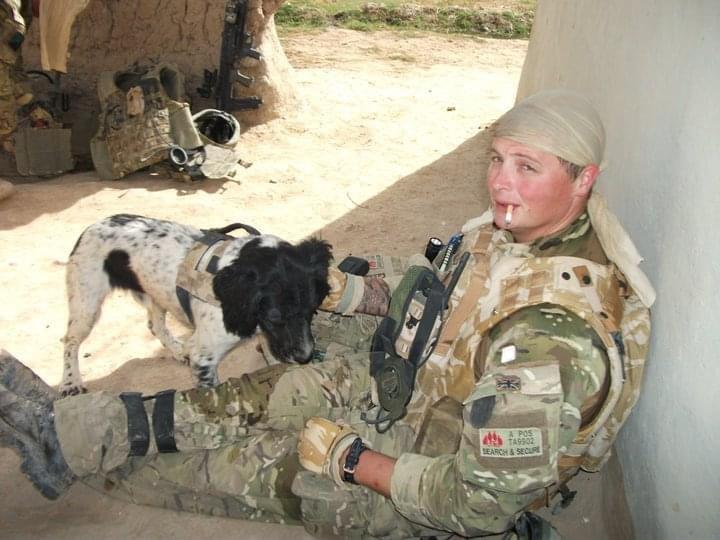
Liam was killed on a Tuesday. Jane received his last letter, a gesture of his love from beyond the grave and only to be read in the event of his death in action, on the Saturday.
She said: “The hardest bit was the first bit – you read the top bit and it says: ‘If you are reading this…’ and you just think…God, you know?”
In his last letter, Liam made several requests. He chose to have Metallica’s The Day That Never Comes played at his funeral. Everyone in the family was to have a good drink and “try to move on with their lives”.
‘I’ll see you on the other side’: Fife soldier Liam Tasker describes ‘fantastic life’ in letter written in event of his death
He said that his family were to remember that: “Each day was a gift, not a given right.” Jane now has the words tattooed on her forearm.
Liam also wrote: “I want everyone to get drunk. And every year I want my mates to mark my death with a rugby match.”
This continues every year in Melton Mowbray, where he was stationed when he was in the UK.
In a previous newspaper interview, Jane revealed that she is still in close contact with many of Liam’s pals.
She said: “We keep in touch with a lot of his friends. Some have PTSD but on the whole they are doing well.
“We all meet up every year and celebrate Liam’s birthday. Then everyone plays a memorial rugby game in May.
“Lots of his friends are married now and having kids. A couple have named them after Liam. There are a few new Liams around.”
Jane wears Liam’s dog tag every day. His father Ian kept his son’s beret and Jane keeps Theo’s harness as a souvenir of the dog who was her son’s closest friend.
Previously, she has also described how she was comforted by other mums via social media.
She said: “After Liam was killed, I thanked Theo in my head for keeping my son safe. I know this might sound daft to some people but it doesn’t to me.
“It wasn’t an IED that got my son and that was thanks to Theo.
“If that great dog could have stood in the way of that fatal bullet, I’m sure he would have. He loved his master that much.”
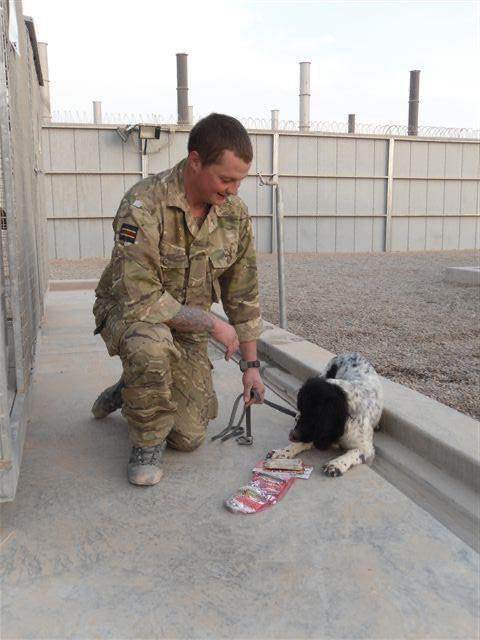
She and other bereaved mums run an online support group, to fill in gaps left by the Army.
“You don’t get a lot of help from the military when you lose a son,” she said. “You’re forgotten about. I hardly heard from anybody. It was unbelievable. I get a bit bitter about it sometimes.
“I’m friends with a lot of other bereaved mums, we’ve got the website, we’re there for one another.”
‘What was my son killed for?’
Now, she says Afghanistan casts a long shadow. Jane is haunted by a country she has never visited.
She said: “When the troops come home, it will be a strange one. I don’t want anyone to go through what we went through for the last 10 years because your life is never the same.
“It affects you in loads of ways.
“I am happy they are coming out of Afghanistan so that families don’t go through all this heartache
“It’s 10 years since we lost Liam and it’s hard. You think what was it for? Things are still the same.
“I am happy that lads and lassies are coming out but at the same time I am thinking what was my son killed for? They are still doing what they were doing 10 or 20 years ago?
People stop to remember the First World War but what about the Falklands War, Afghanistan and Iraq? They are forgotten – it really scares me.”
“I wouldn’t wish this on my worst enemy. For me, he will always be in Afghanistan. It will never leave me.
“That’s our biggest fear – that Liam will be overlooked. I don’t think the dogs get the recognition for what they do either. It just seems forgotten about.
“I have had a woman say to me that my son’s name shouldn’t be on the local war memorial.
“She said he was killed in a conflict, he wasn’t killed in a war. I told her to keep her opinion to herself.”
Jane is now on a mission to keep Liam and Theo’s memory alive. She added: “Kids nowadays don’t even know about Afghanistan. I have been asked to go and talk at the school on Poppy day.
“They don’t understand what it is. My wee grandson, who is seven, he never ever met Liam but he will say: ‘Uncle Liam is in heaven, isn’t he?’
“I go ‘yeah’ and I explain things to him and he goes: ‘He fought in the war didn’t he Gran?’ and ‘He was brave, wasn’t he?’
“He will come out with things and I just think ‘great’ because it’s the younger generation that needs to know about this. Without them, no-one is going to remember.
“People stop to remember the First World War but what about the Falklands War, Afghanistan and Iraq? They are forgotten – it really scares me.”
‘I just want people to remember my son’
As we walked from Liam and Theo’s graveside in Tayport with sweeping views across to Dundee, we admired a flower tribute which bears a red paw print, the insignia of the Army’s close knit team of dog handlers.
Jane turned to me as she fought back tears, touching Liam’s military dog tag that she wears on a necklace.
Her plea is a simple one: “I just want people to remember my son.”
Scotland’s Forgotten War
Scotland’s Forgotten War is an in-depth investigation into one of the country’s longest running conflicts – the campaign in Afghanistan – and how it forever changed our local families and communities.
From Dundee, Angus and Fife to Aberdeen, Inverness and the Highlands, the combat thousands of miles away in Afghanistan has cast a long shadow over people’s lives in the last 20 years.
Read the full series:
- ‘I’ll see you on the other side’: Fife soldier Liam Tasker describes ‘fantastic life’ in letter written in event of his death
- Grieving mother of Fife soldier Sean Binnie hopes son’s death will not be for nothing as troops leave Afghanistan
- Black Watch soldier relives day his friend Sean Binnie was killed in Afghan firefight
- Grandmother of Dundee soldier killed in Afghanistan says British troops ‘should never have been there in the first place’
- Mother of combat medic ‘angel’ says too many lives have been lost in Afghanistan conflict
- Dundee soldier left with shrapnel in his head after grenade attack in Afghanistan
- The Royal Regiment of Scotland: A history of Scotland’s super regiment
- Medals belonging to Perthshire soldier seriously injured in Afghanistan find new home at military museum
- ‘It completely changed my life’: Why journalist Stephen Stewart became a soldier after Black Watch assignment
The Impact team
- Words by Stephen Stewart
- Design by Cheryl Livingstone
- Graphics by Roddie Reid
- Photographs, video and audio by Jason Hedges, Mhairi Edwards, Drew Farrell, Blair Dingwall and Morven McIntyre.
